|
|
|
Sort Order |
|
|
|
Items / Page
|
|
|
|
|
|
|
| Srl | Item |
| 1 |
ID:
146344
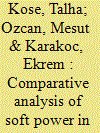

|
|
|
|
|
| Summary/Abstract |
This study explores the relationship between ethnic, sectarian, and religious identities and soft power in the Middle East and North Africa (MENA) region in the immediate aftermath of the Arab Uprisings. Utilizing original public opinion surveys conducted in Egypt and Iraq in 2012, we find that identity-based allegiances play a major role in groups’ choices regarding which countries’ increasing involvement in the region are seen favorably and which countries are seen as an ideal model for the region. Sunnis are likely to view Turkey and Saudi Arabia positively in both regards, whereas Shiites are more supportive of Iran. But our results also suggest that crosscutting cleavages should not be overlooked: Sunni Kurds are less likely to hold positive attitudes toward Turkey and Saudi Arabia. Our findings also show that Copts, a religious minority in Egypt, hold positive attitudes toward the United States and negative ones toward Saudi Arabia and Iran. These findings contribute to both the theoretical literature on soft power and the debates on international competition for influence in the MENA region by emphasizing the role of ethnic and religious identities in shaping attitudes toward international actors.
|
|
|
|
|
|
|
|
|
|
|
|
|
|
|
|
| 2 |
ID:
146340


|
|
|
|
|
| Summary/Abstract |
The surge in Iraq was one of the key foreign policy decisions of the past decade. Its success prompted a second surge into Afghanistan by a new president a few years later. The success of the Iraq surge has prompted work by academics and policymakers alike. One factor of the success of the surge that has been understudied by both academics and policymakers is the role played by the detention of individuals and the changes in detention policy that accompanied the surge. In this paper, I outline a brief informal model of how an intervening state can use detention to help alleviate some of the causes of intergroup conflict to increase the odds of successful intervention. I then show how the changes in US detention policy during the surge contributed to the success of the overall strategy. A key argument in this paper is that detention contributed to the success of the surge even though it was not a primary or public aspect of the surge strategy.
|
|
|
|
|
|
|
|
|
|
|
|
|
|
|
|
| 3 |
ID:
146346


|
|
|
|
|
| Summary/Abstract |
This paper examines the role of honor in the factional competition that shapes Iran’s nuclear program foreign policy preference formation. The literature on Iranian foreign policy recognizes the nature of that process as highly factionalized. I contend that honor plays a significant role in Iran’s factional competition and foreign policy preferences because standing within the Iranian system and Iran’s standing in the international system are intertwined phenomena. Since Iran’s standing in the international system, as a nation-state, reflects back on the political elite as a whole, honor is both an important element in how the Iranian political elite compete for power and how Iran views its relationship with the United States. The role of honor in the factional competition is intensified by Iran’s nuclear program that is wrapped in nationalistic, anti-imperialistic, and revolutionary honor terms. Therefore, any member of Iran’s political elite that can be cast as surrendering Iran’s “right” to enrichment, for example, is called a traitor and is publicly shamed. I bring this to light by examining the discursive practices of honoring and shaming intrinsic to the factional competition for control of Iran’s nuclear foreign policy decision-making.
|
|
|
|
|
|
|
|
|
|
|
|
|
|
|
|
| 4 |
ID:
146338
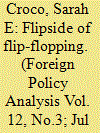

|
|
|
|
|
| Summary/Abstract |
In recent years, the term “flip-flopper” has become increasingly prominent. Politicians employ the term in an attempt to make their opponents look unattractive to voters. The question of whether this tactic works, however, remains unanswered. Existing research demonstrates that citizens do not like inconsistency as a matter of principle, but we know little about its effects in practice. In this paper, I conduct an experiment that allows me to ascertain the effect of a leader’s inconsistency on citizens’ assessments. Contrary to the conventional wisdom, I find that citizens do not always react negatively to a leader who changes his position. Instead, they are generally indifferent between a consistent and an inconsistent politician provided that the leader supports the citizen’s preferred policy in the current time period.
|
|
|
|
|
|
|
|
|
|
|
|
|
|
|
|
| 5 |
ID:
146348
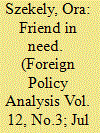

|
|
|
|
|
| Summary/Abstract |
When a regional sponsor of militant movements experiences profound domestic instability, what happens to its clients? This paper explores this question by examining the case of Syria and its clients using a principal–agent approach. It examines three types of principal—single, collective, and multiple—focusing on the varying effects that these relationships have on the agents involved and arguing that each type of principal presents prospective agents with a trade-off between a loss of autonomy and a loss of internal cohesion. By comparing the effects of Syrian sponsorship on nonstate actors who have served as Syrian agents at various points in the evolution of the regime, I demonstrate that each type of principal has distinct advantages and risks for its agents. The paper concludes by outlining five possible outcomes of the current uprising in Syria for the Asad regime's clients, based on the uprising's impact on the regime as a principal.
|
|
|
|
|
|
|
|
|
|
|
|
|
|
|
|
| 6 |
ID:
146343
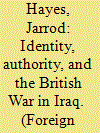

|
|
|
|
|
| Summary/Abstract |
Despite the lack of an obvious threat to Britain, the Blair government invaded Iraq in 2003 alongside the United States. This article draws on securitization theory and social identity approaches from social psychology to propose that the democratic political identity vested in Britain’s domestic society facilitated the Blair government’s effort to construct Iraq as a threat, but in other ways constrained the ability of the Blair government to pursue the use of force without substantial domestic political costs. Using a multimethod approach, the article examines the discourses in the lead up to the invasion to support the central argument as well as to explore the domestic security authority held by United Nations. In so doing, the article addresses not only the British case, but also larger questions regarding the factors that shape the construction of an issue as one of security and the appropriate policy responses.
|
|
|
|
|
|
|
|
|
|
|
|
|
|
|
|
| 7 |
ID:
146341
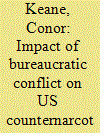

|
|
|
|
|
| Summary/Abstract |
Despite counternarcotics efforts over the past decade, Afghanistan’s drug trade continues to thrive. This article is a review of US counternarcotics policy in Afghanistan, focusing on the inner workings of the bureaucratic machine. During the Bush Administration’s two terms in office, unique agency cultures ensured that no common conception or understanding of the drug problem manifested within the US foreign policy bureaucracy. Various US agencies and officials pursued separate eradication and interdiction policies, and there was similar disagreement in respect to the Alternative Livelihood Program. Consequently, the United States failed to pursue a counternarcotics program that was united, effective, or reflective of Afghanistan’s needs.
|
|
|
|
|
|
|
|
|
|
|
|
|
|
|
|
| 8 |
ID:
146349
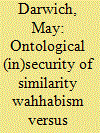

|
|
|
|
|
| Summary/Abstract |
It has long been argued that identity matters in international relations. Yet how identity impacts enmity and conflict among states remains the subject of debate. The existing literature asserts that differences in identity can be a source of conflict, whereas convergence and similarity lead to cooperation. Nevertheless, empirical evidence from the Middle East has long defied this hypothesis. The Kingdom of Saudi Arabia, which prides itself on being an Islamic model and claims Islamic leadership, has opposed the rise to power of Islamist movements in the Middle East. To address this paradox, this article builds on the growing literature on ontological security to propose a theoretical framework explaining how similarity can generate anxiety and identity risks. This framework, I argue, moves beyond traditional regime security approaches to reveal that security is not only physical but also ontological. I then illustrate the argument through a comparison of Saudi identity risks in the wake of the Iranian revolution (1979) and the ascendance of the Muslim Brotherhood to power in Egypt (2012). Ultimately, these cases provide intriguing insights into foreign policy behavior during critical situations.
|
|
|
|
|
|
|
|
|
|
|
|
|
|
|
|
| 9 |
ID:
146347


|
|
|
|
|
| Summary/Abstract |
Americans’ low level of support for intervening in Syria presents a puzzle, raising questions about how democracies approach conflict. Scholars have noted that the US’s public may need to view opponents in conflict as different from themselves before military force is used. But what is the tipping point between perceiving someone as “one of us” or “one of them?” Syrian President Bashar al-Assad’s actions fit the model of a villain, but his appearance represents a divergence from recent leaders cast as enemies of the United States. Using a unique experiment examining citizen evaluations of the Syrian crisis, we demonstrate that a subtle manipulation, darkening Assad’s skin tone, led respondents to view him more negatively, as well as increasing support for US intervention to effect regime change. The effect was magnified among subjects with more ethnocentric beliefs. Our experiment’s findings have implications for racial priming, ethnocentrism, and American foreign policy.
|
|
|
|
|
|
|
|
|
|
|
|
|
|
|
|
| 10 |
ID:
146342
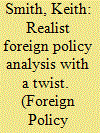

|
|
|
|
|
| Summary/Abstract |
Analyses of US post-Cold War foreign policy in the Persian Gulf symbolize realism's new found concern with foreign policy analysis. Prominent realists attribute specific policies to domestic concerns and how they have dominated policymaking in the era of US primacy. Although convincing, this perspective is not comprehensive. By drawing on regional security complex theory, it is possible to map the regional developments that have equally constrained and incentivized the rise and fall of dual containment. This more extensive account produces two important findings regarding realism's neglect of the regional level of analysis. First, realists overstate the domestic determinants of US policy in the Persian Gulf. Second, and more broadly, realist foreign policy analysts underspecify systemic pressures that shape and shove a country's foreign policy.
|
|
|
|
|
|
|
|
|
|
|
|
|
|
|
|
| 11 |
ID:
146339


|
|
|
|
|
| Summary/Abstract |
Existing scholarship regarding the impact of faith on foreign policy public opinion is divided on whether religious factors have any direct influence that is independent of political predispositions. I address this debate by analyzing the effect of religious background on attitudes toward the conflicts in Iraq, Afghanistan, and the Persian Gulf. Using American National Election Study data sets and a series of regression estimates, I find that the impact of religious factors—in terms of affiliation, attitudes on the Bible, and religious behavior—on perceptions toward each of the wars is rather indirect via political predispositions. The contribution of the piece lies in utilizing the Karlson, Holm, and Breen method to capture for the first time the exact scope of mediated effects for religious variables. In so doing, the study provides new insights on the patterns of interaction between religious and political factors shaping war-related attitudes.
|
|
|
|
|
|
|
|
|
|
|
|
|
|
|
|
| 12 |
ID:
146345
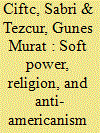

|
|
|
|
|
| Summary/Abstract |
This study presents the first systematic analysis of the public opinion dimension of soft power competition in the contemporary Middle East. Building on the scholarship on perceptions of foreign states and Arab public opinion, it proposes a series of hypotheses about sectarian identity, religious worldviews, and anti-Americanism as determinants of attitudes toward Turkey, Iran, and Saudi Arabia in the context of regional rivalry. It then presents multivariate probit estimations utilizing Pew Global Attitudes Survey to test these hypotheses. The findings suggest that religious identity and worldviews directly affect favorability ratings of these three powers in the Arab Middle East. While Sunnis favor Saudi Arabia and Turkey over Iran, religious individuals demanding Islamic law favor the Islamic Republic. Furthermore, anti-Americanism translates into lower support for Saudi Arabia and Turkey, but greater support for Iran. Democratic attitudes have no influence over perceptions of these three powers indicating the limits of democracy promotion as a foreign policy tool.
|
|
|
|
|
|
|
|
|
|
|
|
|
|
|
|
|
|
|
|
|